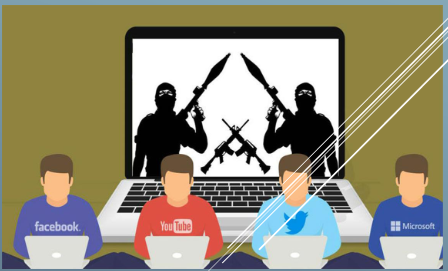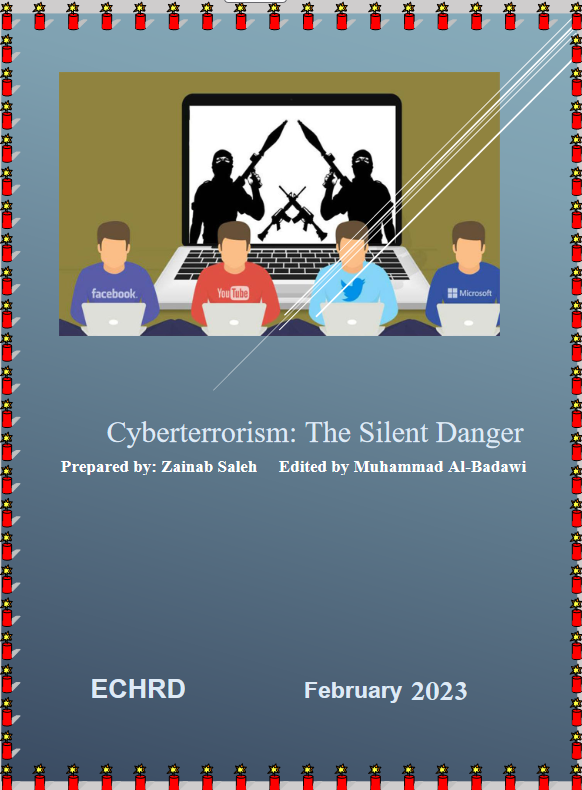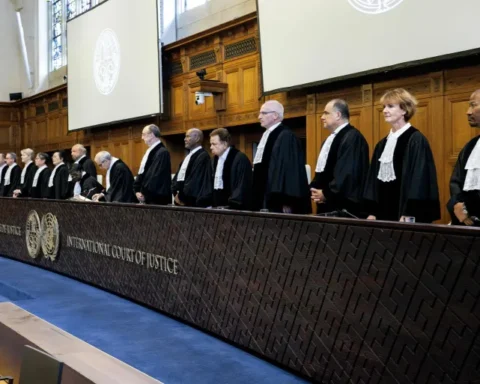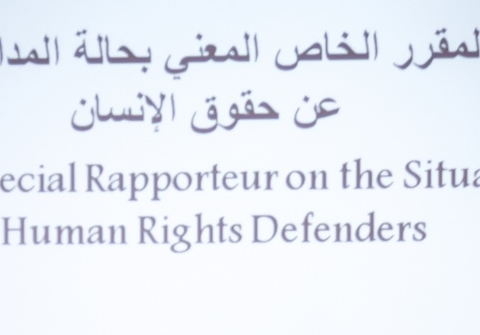Press Release
………………………………………………………….
Today, Tuesday, 28/2/2023, The Egyptian Coalition for Human Rights and Development (ECHRD) has published its report “Cyberterrorism: The Silent Danger”, which discusses the subject of cyberterrorism through several themes: the definition and origin of cyberterrorism, identifying ways of using the Internet in terrorist acts, clarifying the role of social networking sites in spreading extremist ideology among young people, why extremist groups use social media sites, clarifying terrorist groups’ recruitment methods of youth through social media sites, social networking sites, identifying how electronic games are exploited in terrorism and recruitment, clarifying what the game of “Salil al-Sawarim/Clashing of the Swords.” is, explaining the impact of electronic games on the growth of terrorist behaviors among young people and children, identifying mechanisms to confront the phenomenon of youth recruitment into terrorist groups, identifying international and Arab efforts to combat cyberterrorism, and presenting some recommendations to address this threat to the entire world.
Cyberterrorism is considered one of the most heinous and dangerous crimes committed via the Internet and threatens the world with its automated era. It exploits the cyberspace by creating terrorist accounts on social networking sites to spread extremism and terrorist ideology in the world and communicate with its members on how to penetrate and destroy sites, spread viruses and spy on countries, revealing their secrets. They blackmail them to achieve terrorist purposes, obtaining financing for their terrorist activities, and destroying the infrastructure of countries. This contemporary terrorism is considered the electronic version of traditional terrorism.
The report indicated that terrorists have become very sophisticated in their exploitation of communication technologies to communicate with each other without revealing their identities when planning terrorist acts.
Terrorists may use a simple email account to create messages in a “virtual mailbox or inbox”. This means that messages are written without sending them, leaving only minimal digital traces behind. It can be viewed on any Internet-connected device around the world by multiple individuals who know the password to that account.
In addition, the interactive and immediate nature of the Internet and its ability to reach different groups of individuals around the world, help extremist and terrorist groups use the Internet to access sources of financing and financial support, which appears in several forms followed by the websites of these groups.
Extremist and terrorist groups use the Internet to win the sympathy and support of others, especially young people. They try to recruit them and obtain their assistance and support for the terrorist activities they carry out, and achieve that goal through various mechanisms.
Social networking sites have contributed to the dissemination of a set of negative behaviors among youth, making them vulnerable to what is called intellectual stagnation and non-acceptance of the other. It also contributed to spreading the culture of treachery among the members of the same society, and thus becoming a fertile soil and a growing environment for the dissemination of extremist terrorist ideology.
The report showed that extremist terrorist groups are working to attract youth, through the attractive media strategy they use, through which they can obtain the sympathy of many within these groups. Youths of different ages and different levels of education are targeted through the use of social networking sites. They are luring and then recruiting them into those terrorist groups that transcend countries and continents
Electronic video games were also able to achieve a wide spread popularity by relying on immersing players in an alternative and experimental reality to build their identities. Terrorists and extremists took advantage of this point to recruit “fuel” for their wars, and take advantage of these platforms to plan their heinous operations, and communicate with each other.
The report also mentioned that we are facing a real crisis of communication, according to which the electronic game turns into a tool for deepening alienation and a means of isolation and introversion by distancing children from themselves and their reality. Most of the dialogues that take place when they play killing games tends to express belonging to new social groups that are real in reality, whose ideals, values and cultural references are inspired by the culture of violence, war and destruction. It is not based on the principles of honor, freedom, justice and tolerance as much as it calls for force, opportunism and domination, and raising children and youth not to abide by the system and work according to it, instilling in them negative attitudes towards preserving public and private property. These values and attitudes perpetuate terrorism.
The report concluded with a series of recommendations:
• The need for parents and teachers to monitor children and youth when they use information technologies, especially the Internet, to ensure the safety and legitimacy of use, and guide and inform them of the issue as it is related to the security of the homeland and the citizen, so there is no room for tampering and sabotage.
• The attention of the family, including the parents, and the regular and continuous monitoring of their children, avoiding them playing electronic games that contain violence, which may lead to trauma for children or imitation of violence in real life.
• The dissemination of educational and cultural games suitable for children and reducing violent games needs to be encouraged, provided that cultural and media institutions assume this task along with the Ministry of Education.
• Programmers, innovators and educational thinkers must design and program electronic games that take into account the educational, cultural and educational aspects of the formation of children and youth, to the same extent that they are keen on presenting the elements of suspense, entertainment and excitement.
• Governments should cooperate with the organizations responsible for social networking sites to monitor and identify accounts affiliated with terrorist groups and work to prevent their spread on social networking sites.
• The need to hold conferences, seminars, workshops and panel discussions on the phenomenon of terrorism in general and electronic terrorism in particular to identify its sources, methods, causes, motives and risks and develop effective solutions to confront it and limit its spread
• Governments begin to identify and put in place serious steps to develop religious discourse in order to resist the ideas that terrorist groups seek to spread.
• Arab efforts need to be unified towards setting strict regional legislation to combat cyber-terrorism crimes.
• The sponsoring of a national project to produce Egyptian electronic games to confront terrorism and cultivate national values among youth.








